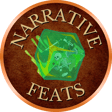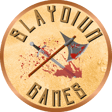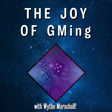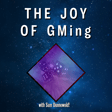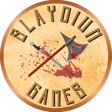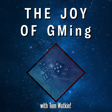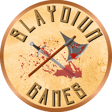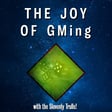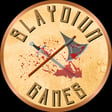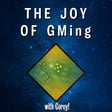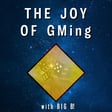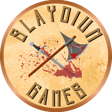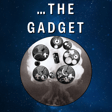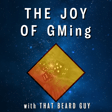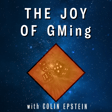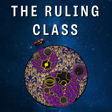Introduction to 'The Joy of GMing'
00:00:34
Speaker
Whether you're at a gaming table, in your comfiest chair reading a book, or listening at home, there's nothing like a great adventure story. But they don't happen by accident. Welcome to the joy of GMing, a special interview series on the craft of great gaming. There's just something magic about sitting down to a good table with great friends, isn't there?
00:00:55
Speaker
If you're a lifelong gamer or a newbie rolling up your first character sheet, if you're a DM or a GM or just can't get enough tabletop talk in your day, this is the show for you. Each episode will bring you amazing guest speakers to talk about writing games and running them, building fantastic worlds and compelling story arcs, and oh so useful, tricks of the trade.
00:01:17
Speaker
Hear some amazing stories, get inspired for your next game, and join us for an hour and a half or so of lively conversation. This sister series to anywhere but now, our Doctor Who actual play podcast, will be released between mods or episodes with our ongoing serialized show. We cover some making of and behind the scenes tidbits of our latest mods as well, so do stick around.
Casey's Creative Background
00:01:42
Speaker
I'm Casey Jones. Over the last dozen years, I've written and produced screenplays, children's animation for TV and film, graphic novels, stage plays, murder mysteries, and audio adventures. I've also been writing and running tabletop games for over 10 years.
00:01:59
Speaker
Join us as we dive deep into tabletop with experts in the field.
Meet Craig Hatler
00:02:04
Speaker
Experts like our special guest today, Craig Hatler, creator of Shadowlight and Personae. Craig is an IT desktop support manager for what is historically an African-American college in Raleigh, North Carolina.
00:02:16
Speaker
He's been playing tabletop games for over 30 years and has been developing and designing his own games for at least half that time. Wow. Craig, thanks so much for joining us today. Thank you for having me, Casey. You're very welcome. Craig, tell us what drew you to designing your own game
From D&D to Shadowlight and Personae
00:02:34
Speaker
So I shall harken back to the days of 2007, the days of yore, when Wizards of the Coast announced that they were moving forward from 3.5 D&D to 4th edition D&D. And at the time, I and colleagues of mine, fellow players, I was in a gaming group in Northern New Jersey, which is where I grew up and spent basically my 20s and 30s.
00:03:03
Speaker
And we were working on an original fantasy setting for 3.5 D&D at the time. And then Wizard of the Coast said, well, we're going to put out fourth edition and we're going to make it drastically different from 3.5. And we're going to release it under a much more restrictive license than the OGL. And we all looked at each other and said, well, if this is the case, then why are we
00:03:33
Speaker
Why are we continuing to use this rule system by this big?
00:03:38
Speaker
mega corporation that they just have their own plans and they're not really interested. I mean, and 3.5 had been out for five years, four years up until that point, and then 2008. Third edition in its entirety was out since 2000. And it's what was coincided with the open gaming movement. You know, you have the open gaming license and you have this freedom to be able to release
00:04:05
Speaker
your own supplements, your own adventures, your own campaign settings. And that spirit, I guess, seemed like it was, well, you know, we're just not interested in this anymore. But what I find very interesting is that it seems to have all come full circle as of this past January because we are now past fourth and into fifth and was released under the OGL.
00:04:29
Speaker
But then, Wizards of the Coast had this bug again where they're like, yeah, you know what? Maybe the OGL isn't doing so great for us until the community pushed back. Yeah, we're all going to go running for the hills. But that is where things started as far as Shadowlight and Persona is
Developing and Playtesting Shadowlight
00:04:46
Speaker
concerned. Shadowlight and Persona, basically, we decided that we were going to release our own original rule system, that we were going to draw upon all the different games that we had played
00:05:00
Speaker
individually together as a group with other people in our respective histories as tabletop role players. So that's what we set out to do. We played it and we playtested it actively I would say from about 2007 through 2010 and then each of us in the group sort of we all went off on our own directions and
00:05:23
Speaker
I moved, I moved from New Jersey to Connecticut and then from Connecticut four years ago down here to North Carolina.
00:05:31
Speaker
around July of last year, so 2022, I basically had gotten the idea that I really wanted, I had gotten very involved in the TTRPG community over Twitter. I was starting to connect with other indie designers and decided that it was the right time for me to take this thing that had been sitting on the shelf collecting dust and basically
00:05:56
Speaker
So let's take it, let's polish it, let's look at the language, make sure the language is inclusive, and then let's see what could be done to get it published for real. For real. Yes, we love those air quotes covering over those dangerous two words.
00:06:14
Speaker
Brilliant. So how do you describe Shadow Light and Persona to new players?
The World of Shadowlight and Personae
00:06:21
Speaker
Basically what I kind of my elevator pitch is to imagine yourself in a world where
00:06:32
Speaker
things aren't always what they seem or things may seem out of the ordinary and will get you curious and you will soon find that the strange and the mysterious and the whimsical and wondrous is in fact something more than just fairy tale and mythology and
00:06:54
Speaker
Now that might be a good thing. It might be a terrible thing. It might be, you know, it might endanger the safety and security of your friends and loved ones. But nevertheless, there is more to the world out there than what you're able to see with your experience, with your senses. I was influenced a lot by anthology fiction when it came to the kind of storytelling that I wanted to do with Shadowlight and Persona. So Twilight Zone, more recently things like Black Mirror,
00:07:24
Speaker
Guillermo del Toro's Cabinet of Curiosity is basically this idea that, you know, you can have this encapsulated story, you know, whether it takes place, in TTRPG terms, whether it takes place in a single one-shot, or maybe over the course of three or four sessions. A stand-alone.
00:07:43
Speaker
us exactly and that standalone can and one standalone could look very different from another you know you could have because you're going to have an opening discussion with everybody at the table in your room and you're going to say hey where do we want this to take place what uh what kind of time period what are the the genre conventions that we're going to look at are we going to mash up genres are we going to throw genre out the window i mean i i grew up with um
00:08:10
Speaker
you know, things like He-Man and Thundercats and Voltron. Same. Basically, which the lines between genre were blurred. The idea that you had these worlds where you had magic and you had technology, and there was really no distinction. Like, I didn't really start... I don't even know when I started using genre terms, to be perfectly honest, but I grew up with that before ever getting my hands on pure science fiction or pure fantasy. So... Let alone light sci-fi.
00:08:40
Speaker
Oh, yeah, light sci-fi, hard sci-fi, you know, high fantasy, sword and sorcery, if you want to talk, you know, Conan and Robert E. Howard and Fritz Lieber and Elric and things like that. Yeah. As a matter of fact, my New Jersey longtime gaming group of friends made sure to mock me mercilessly because I had not seen Conan the Barbarian prior to 2000.
00:09:08
Speaker
It just never came up. They were horrified when they heard that I had not seen it before. I had been playing D&D for as long as I have. I had never seen it before. But meanwhile, I grew up with Dark Crystal and Star Wars and Return to Oz. Labyrinth. Labyrinth, exactly. Jim Henson, Brian Froud.
00:09:33
Speaker
all these strange and dark crystal I credit as a significant influence on the lore in Shadowlight. The idea that there was once this species and then something happened and then there were no longer that species, there were species that took its place and once the story there, did they split? Did one go away and others come in?
00:09:55
Speaker
You don't really know for sure. So Dark Crystal is a big influence for me as the kind of stories that I enjoy experiencing, telling, being involved in. So yeah.
00:10:09
Speaker
It's incredible how even a single piece of fiction, whether it's a short story as part of an anthology or an episode of the Twilight Zone or even something as involved as an entire world that only exists in one feature film and decades later a streaming prequel can
00:10:31
Speaker
leave an entire crater in your impressions of like, oh my god, that was incredible. My worldview has changed. I've been pulled towards something that speaks to me. I would love to hear how you developed your own lore for Shadowlight and what makes it unique for you and for your players.
Multiverse Concept in Shadowlight
00:10:55
Speaker
so the the lore for shadowlight was intended to drive the idea of a of a multiverse which is actually kind of funny because we're inundated with multiverses nowadays now yes yeah now but i mean when when
00:11:10
Speaker
And I guess they really have been around ever since, you know, Crisis on Infinite Earths, if you go to DC Comics, you know, they've been around since the 70s or 80s, but really, for me, I wanted the ability to, for characters from different gaming groups, to be able to jump tables, basically, to have a common rule system that,
00:11:40
Speaker
in at this table they're playing they're playing uh space opera and you know rocket ships and ray guns and and all of a sudden oh no a wormhole opens or a tear in the fabric of space time and they get sucked in and now it's you know it's a world where it's very um like i think tsarist russia in 19th century only the royal the royal families all have
00:12:05
Speaker
these giant robots that serve as their personal guardians. As one does. Yes, exactly. And I mean, they're legacy robots. They're passed down from generation to generation. And they're a status symbol for the different royal families.
00:12:24
Speaker
And I mean, I just completely pull that out of thin air. Wonderful. So that was kind of my primary driver. You have this group here in... I mean, I have played in groups that lasted for the length of a convention. I've played in groups that have lasted for years. One group in particular. I went to Villanova.
00:12:48
Speaker
from 96 to 2000 and I have remained close with my D&D group from there starting in roughly 2000 and have continued to meet up with them at least once a year now for over 20 years and in some cases we have actually as a matter of fact it was I believe this past July because we meet up every summer. We picked up characters that we haven't touched in in over 20 years.
00:13:14
Speaker
Wow. From the very first D&D campaign, we all participated in it. And that's what I wanted. The ability to make a character where the rules, at least the kernel of the rule system, is common enough that they can jump from one table in one group, because every table in every group is going to house rule. They're going to
00:13:37
Speaker
You know, even if it's, even if it's dungeon D&D or, or, uh, room quest or whatever, these highly, you know, specific published games. People are going to house rule to, to some degree or another, or, you know, and in some cases they might rip out whole subsystems and who knows. But I wanted a kernel. I wanted something very, I wanted to effectively just a core mechanic. Like here's how you make characters.
00:14:06
Speaker
Here's how you resolve conflict. I wanted those things to be universal so that way the characters all operated the same way. So if you truly had a cross-genre or cross-setting event where you had multiple characters from multiple different campaigns all wind up at the same table, that you could do that with a minimum of headache.
Character Creation and Flexibility
00:14:28
Speaker
That's really smart. What is it like using Shadowlight to build PCs? Coming from games that don't have classes and don't have levels, I played a lot of West End game Star Wars D6 in high school and in college. I could have you make a character and do that. I could do it off the top of my head. I don't need a book. That's how often I ran it.
00:14:52
Speaker
I wanted that flexibility. I didn't want characters to be tied into an archetype. I mean, you could if you wanted to. I could provide you with guidelines or pre-generated characters, but ultimately I wanted, you have points that you distribute to attributes, you have those attributes, and then you have traits. So those are the two categories of a Shadowlight and Persona character, is attributes and traits. So your attributes,
00:15:21
Speaker
By default, you have six, and they do things. They're your social stat, your physical stat, your mental stat. Coordination. Yeah, exactly. Again, that being the default, people can take that kernel of the rule system and say, hey, you know what? We don't need six attributes. We just need three. Or we just need four. Or we just need two. I want people to muck with the system, to muck with the rules. I want people to tear it apart and put it back together again.
00:15:51
Speaker
and have it suit their needs. So by default, six attributes, the attribute serves two purposes. It acts as a modifier to a die roll, and it determines the maximum number of a given trait. So each of the attributes is linked to a trait, and if you have a three in that attribute, then that means the maximum number of that particular trait that you can have is three.
00:16:20
Speaker
And so the core mechanic for dice rolling is it's all D10 based. Okay.
00:16:28
Speaker
Show some love to the D10s. Yes. So you have skills and your skills tell you how many dice you roll. So if I have a sword skill or a strike skill, I always want to encourage people to make skills that are active. It might be swing or it might be slam or smash or slice, you know, some sort of... A lot of S words. A lot of S words, yes.
00:16:52
Speaker
you're going to choose a relevant attribute to connect to that because that's going to be the modifier that you use. So if it's Smash, it might be very physical, it might be, you know, brute force. So it would be your stature attribute and it would be, so your stature attribute would be
00:17:07
Speaker
two, three, four, and so on up. And then your smash skill would be X number of dice. So you have a rating in that skill that tells you how many dice to roll. So if I don't like you and I want to smash you, I'm going to roll the rating number worth of D10s. And I'm always going to look at the top die. So the highest result that I roll. So if I roll a three, a four, and a seven, then the relevant number to start is the seven.
00:17:33
Speaker
I add my modifier. So you keep the highest die that you roll? You start with it because there's always the possibility of ties. So the more dice you have, the person with more dice always has a better chance of winning out in the challenge because you have the potential to break ties. Nice. That makes sense. And again, that's the default. And what I really love, and I probably need to start doing this myself,
00:18:02
Speaker
start using the multiple dice as a jumping-off point for alternative resolution methods. What you see in a lot of games since I would say maybe the 2009-2010, Apocalypse World was this thing that kind of ushered in the concept of moves and fictional triggers, but also the idea of success with consequence, so you don't have the binary success fail.
00:18:27
Speaker
you have the you have the middle ground where it's okay well you succeed but something happens you have to give something up or you have to or you lose something or something help help something else happens in addition to that success so i see the core mechanic of the challenge in in shadow line persona to be fruitful ground
00:18:49
Speaker
Or having to offer a lot of opportunity to say hey, well, maybe instead of worrying about ties Maybe that second time means something maybe that maybe maybe the GM says hey You know what instead of using the top now you have to use the second time Maybe it's a desperate search situation or something like that. There's a fictional positioning is another I want to say that there's another concept that you know, you might be
00:19:14
Speaker
You might be trying to deactivate the bomb, and you've got gunfire over your head, and things are just really, really terrible. And it's just you're in the situation where you're really under the gun, so you may not be at your best. Exactly. Yeah, you may have to take the next die down. And yeah, that's just sort of my like tinker experimental mind, thinking about all the different ways in which
00:19:41
Speaker
But again, present the, present the kernel, present the core mechanic, and then let people tear apart and do whatever they want with it. Nice. Yeah. We've had success with similar mechanics, uh, running the cubicle seven, dr. Who games where, you know, if for instance, someone is trying to deactivate a ticking bomb,
00:20:02
Speaker
that will be more difficult if like you say they also have to deal with keeping their head down to avoid blaster fire so there's a plus two to the challenge rating or they could be at disadvantage and they have to roll an extra die and keep the lower of the two
00:20:18
Speaker
those darn cybermen. And just like you mentioned like rolling low or rolling one on the die can give you one of those nice modifiers like yes but so yes you manage to slow the ticking but it restarts again at the start of the timer. Oh no there was a there was a mercury switch that was you know underneath the
00:20:42
Speaker
you know, underneath the timer and now, you know, you have to make, you have to keep it steady otherwise, you know, it's like you're finding multiple layers of dastardly whatever. We love our dastardly layers. We absolutely do. Yeah, no, absolutely. So...
00:20:58
Speaker
Walk us through some of the collaborative storytelling that I've seen done on your YouTube channel and described in the core mechanics.
Collaborative Gaming Philosophy
00:21:09
Speaker
What makes the Craig Hatler approach to collaborative storytelling unique? I over the years have played so many different games with so many different people and in environments like conventions and your friendly local gaming store and
00:21:27
Speaker
I've played with people of all different ages, gender, ethnicity, background. As far as I'm concerned, the best experiences come out of that collaborative environment, that kind of environment where there is no status level between the GM and the players.
00:21:48
Speaker
where the GM is just a player with a special set of moves and yes the GM might be the final arbiter but I but me as the GM or in the case of Shadowlight and Persona I decided to call the GM the chorus because I was very much in keeping with the concept of Greek tragedy and your
00:22:06
Speaker
your theater masks. So the chorus is the collective body of NPCs, but is also the moral compass for the gaming experience. The chorus wears a variety of hats. That's wonderful. I think that everybody at the table deserves to have some degree of agency when it comes to guiding the course of the game and guiding the course of the story and the narrative to really reinforce that
00:22:36
Speaker
collaborative experience. So I have taken a lot of cues from story games, from the Forge movement from the early to mid 2000s. Ask questions and act on the answers. Draw maps and leave planes.
00:22:54
Speaker
because at the end of the day, I mean, I've been in games where I was expected to sit back and be railroaded. Nobody likes that. I was in game, I was in it, I was just literally just recently. So within the last 10 years, when I lived in Connecticut, I was in a D&D game where the DM clearly said,
00:23:14
Speaker
Well, I've written this setting and I've written my plot. And there's really nothing, I mean, he's obviously didn't say it out loud, but he demonstrated in the way that we play the game. You're gonna sit back and you're gonna watch my game, my story. And there's really nothing, you can do things individually, like you can go into an encounter and you could fight the apple-eth and you could kill the apple-eth and hooray.
00:23:40
Speaker
As far as the meta plot or as far as the over marking, this stuff is going to happen regardless of what you do. And we kind of didn't really realize that until a certain point in. And I was like, yeah, if it weren't for the fact that I love the table and I love the people that I'm playing with and I love
00:23:58
Speaker
the role playing and the play acting and all that stuff, I'd be like, have a nice life and walk away. Because some people just don't understand that if that's what you want, then write a novel, write a story, go home and grab a 50 cent composition notebook and write your Game of Thrones fan fiction.
00:24:19
Speaker
it's all good but that's not what it's supposed to be certainly exactly it's not it's not what it's supposed to be and it's not and it shouldn't be that it should be that the people at the table the players using their characters at any given time have the ability to
00:24:35
Speaker
This is what I want to do and what they decide to do should have impact on the course of the narrative. Absolutely. On the course of the play that emerges. There should never be this, well, you know, I prepared this, you know, I wrote this, you know, oh my gosh, I can't believe that they didn't, you know, go this way and they didn't find my dungeon. Well, too bad. The other side of the coin to that is there should be some discussion in advance.
00:25:02
Speaker
there should be what kind of game do you want to play, especially when you're playing one as huge as D&D, where it's, you know, what kind of game do you want to play? Do you want to play an investigative game, an explorational game, an intrigue? You know, do you want to be monster hunters? Well, you know, not just setting, but also tone and premise. And those are the kind of questions that I loaded into the beginning of game creation for Shadowlight Persona to say,
00:25:29
Speaker
What kind of game do we want to play? Is it going to be serious? Is it going to be light-hearted? Where is it going to take place? Is it going to be in the real world? Is it a fictional world? So you answer all these questions in advance. Absolutely. Because you want to make sure that everybody at the table is on the same page.
00:25:46
Speaker
It really is a part of not only setting the table, but building on expectations, like using systems like lines and veils. I've recently had interesting challenge putting together a table of Curse of Strahd, one of the scariest D&D campaign settings, and then incorporating the lines and veils of my four players, making sure that the House of Horrors that they, you know, waywardly
00:26:17
Speaker
climb into does not have any of the things they have explicitly said they want nothing to do with. Which is fine. You can custom tailor a setting and the tone of the story that you're telling so that it does avoid and respect the wishes and the tastes
00:26:39
Speaker
of your players without condescending them, without patronizing them. Without making them feel unsafe. Exactly. I never want my players to feel unsafe at the table. I want their characters to feel unsafe. That's part of the joy for me.
Player Agency and Narrative Impact
00:26:59
Speaker
the uncertainty of the of the math rocks that they are rolling but I absolutely take into account how much roleplay do they want versus how much hack and slash violence just as you say is this a game that's going to involve things like courtly intrigue
00:27:15
Speaker
Would they rather be investigating a mystery of some kind? Whether it's in sci-fi or fantasy or in war setting, things like that. So that with their expectations in mind, we can bring something to the table that is satisfying, that acknowledges that you've listened to your table, which they are going to eat up.
00:27:36
Speaker
They're gonna eat it up with both hands and also respect what they've clearly told you they are and are not interested in. Because almost as bad as disrespecting a player by bringing something that violates one of their lines or crosses one of their lines, almost as bad as watching a player's eyes glaze over as they lose interest because we veered off onto an info jump for 20 minutes and there's nothing for them to do.
00:28:04
Speaker
Where's, literally, where is the fun in that, you know? Right. Also, too, I heard once I had a friend describe story gaming and collaborative role-playing as being like jazz.
00:28:19
Speaker
And you don't get that from having an individual author. You don't get that from having, you know, you certainly get a result that is art, but it's a different type of art. And the collaborative aspect of tabletop role-playing has always resonated with me in that respect because there are outcomes that you can see unfold
00:28:43
Speaker
in a collaborative environment that you never would having a single author. No. And to give you a perfect example, so just recently I was fortunate to be invited to an actual play, I guess, a group called Nerds with Dice. Okay. And they set up, I want to say that their default is they set up three session games.
00:29:08
Speaker
So they do their casting call, they get people who are interested, get everybody in together, talk about, you know, have them fill out a questionnaire about those lines and veils in advance, then you get together to discuss them.
00:29:24
Speaker
And then you start your, you start with, so you really have a, you have a session zero and then you have episode one, episode two, episode three. And one of the players at, in the girls, first of all, everybody came to it and they had almost decided in advance that, okay, well, based on your, your pitch, it sounds like very much like we're going to do kind of a modern day supernatural type of environment. So.
00:29:51
Speaker
you know, 2020s cell phones and internet and whatever, but there's gonna be creepy things. And it's not something that I ever had done. Everything that I had done as far as Shadowlight and Persona had always been like, this is very strongly fantasy. This is very strongly sci-fi, very strongly steampunk and so on. But I never really explored the idea of a modern game to any real death.
00:30:20
Speaker
I decided without going into a whole lot of exposition, especially because you can go and you can watch the first two episodes. So the first two episodes are available on their YouTube. And the third episode just happened last Tuesday and should be on their Twitch. Basically, I decided to set everything in. My ex-wife lived for a little while in Yorktown, Westchester County in New York. And so there's a lot of turn of the 20th century buildings.
00:30:48
Speaker
And there was one in particular called Ansonia Lodge, which was a boarding house in the turn of the 20th century, which had been passed down and changed hands and was turned into an apartment. It looks straight out of a steampunk store. There's pictures of it. If you Google Ansonia Lodge, it's in Mohegan Lake, New York, and it looks like it's straight out of a steampunk store. It's that Victorian architecture.
00:31:12
Speaker
And I'm like, this is going to be the perfect neighborhood for the strange things that you might find in a Shadowlight and Persona game. And that's what it became. It became this revelation to the players that there is something more about the world.
00:31:28
Speaker
than what we previously understood. One person in particular, one player in particular, she wrote her character, his name is Declan, and he's going home for the first time after his mother passes away to go through her effects.
00:31:44
Speaker
He had a very strained relationship with his mother. His mother was into all these sort of like esoteric things, crystals and tarot cards. And so as a kid, he was mocked for having a witchy mom. And so he went in the absolute opposite direction, you know, purely rational, purely empirical.
00:32:04
Speaker
went to college to be a history teacher, really wanted nothing to do with anything that was esoteric work or a cult or anything like that. Well, in the discussion
00:32:15
Speaker
in kind of having a very brief backstory discussion with the player, I said, well, okay, here's everything that we know about the mom. What about Declan's dad? And so we start jamming. One of the questions that did not come up in the safety discussion was, how do we feel about family members who have passed? I lost my dad about five years ago and- I'm sorry. Oh, thank you.
00:32:40
Speaker
So I just wanted to make sure, I was like, is everybody cool with us talking about family members, brothers, sisters, parents who have died? And nobody really had an objection. Nobody really had a strong line. Yeah, no objections, no strong lines on it. And I was like, all right, well then, so the story of Declan's dad, I didn't know this in advance, and it's part of not really
00:33:03
Speaker
plotting in advance or not scripting in advance was the story of Declan's dad became the driving factor for the plot. And it wasn't until I read the backstory that Julia had written for Declan to get that and I picked out that little bit, okay, dad died before Declan was born.
00:33:25
Speaker
Well, what Declan discovers is that dad didn't really die. Dad disappeared. And that's where everything kind of, both literally and figuratively, that's what caused everything to start. But you don't get that from scripted written fiction because you don't have that interaction of two people. No. That's one of the things I love. And that's what I love so much about tabletop RPG isn't about collaborative storytelling.
00:33:55
Speaker
It's critically important that the GM or DM be open to surprise, pleasant or otherwise, from their players, from the dice, just from if they expect the players to zig left and they decide, oh, let's zag right. There's this really interesting rock over here that caught our attention.
00:34:17
Speaker
for half a minute that is a lot more interesting to us than the glowing tree that's trying to sound wise and dispense quests, you know. There is certainly a challenge to that because with certain storytelling archetypes, step one of the evil plan needs to go off so that we can worry about the possibilities of step two and step three.
00:34:44
Speaker
But if the players do their damnedest and actually thwart step one of the evil plan, well, the GM better be prepared to roll with it. They better have, like, you know, be able to spin a backup or say, oh, no! And then the floor explodes and an even worse baddie rises up through the smoke and the rubble, you know. Or conversely, the GM says, hey, you know what? I really didn't see this coming. I have to be honest with you.
00:35:14
Speaker
You could have five different contingencies for what might happen. You could envision, okay, the players might do this, the players might do this. You could literally not see coming. What happens when you have a level of communication and trust with the table to say, hey, you know what? I didn't see this coming. And as much as I prepared in advance, I need to regroup. I feel like that's an important thing
00:35:42
Speaker
for both sides of the table. I feel like the players should be respectful of the fact some degree of work goes on the part of the GM goes into understanding the game that you're playing, understanding the rules, understanding the published content, whether you're flipping open the monster manual and you're using a monster that's already stated.
00:36:04
Speaker
or if you're flipping open a pre-written adventure and everything is scripted out in advance. I feel like the GM shouldn't feel embarrassed or inferior by saying, hey, you know what guys, I need to, you know, even if it's I need 10 minutes, it could be I need 10 minutes or I could need until next week. I mean, I just feel like that GM should be able to say that and not feel like they're letting their group down.
00:36:30
Speaker
I think that's important. I recently had an experience with our Anywhere But Now table with an upcoming mod. We'd gotten through the first half, more or less, of the adventure and
00:36:46
Speaker
something just hadn't been clicking for me. And after Weed wrapped up, I talked with the group about the possibility of taking a mulligan with half of the adventure past a certain point because it felt like it had gotten a little bit lost in the weeds.
00:37:04
Speaker
But I felt comfortable enough with them to say something needs adjusting here. I don't feel like the table is necessarily having as much fun as they could. I don't know that this is going to be as much fun to listen to as I had hoped. You know, I want some time. Take it back to the drawing board for a second. Look at what's going on and make adjustments. And we had a short conversation about that.
00:37:29
Speaker
And being able to trust your team, have an open dialogue about that is really important. Now, obviously, no one enjoys getting caught flat-footed. That's why it's called flat-footed. Right. But trusting in players that you've played with before and have built some rapport with, you know, by building trust, by giving them a fun time in your company where they can feel safe,
00:37:57
Speaker
to roll badly or make decisions in haste. Or watch them roll really, really well. Exactly. Yeah. I mean, in that Nerds with Dice game that I just ran, the third episode, one player in particular, was just literally on fire. And I was like, hey, more power to them. I mean, that's another thing, too, is just being a fan of the characters.
00:38:26
Speaker
despite all of the terrible, awful things that you're throwing at them, you know, the Tomb of Horrors and all this. Yeah. I still want to see them win. I still want to see them, you know, accomplish whatever their goals are, not like, you know, kicking puppies or, you know, stealing kids from children.
00:38:44
Speaker
I mean, there's something to be said for the mwahaha moments. They're very fun. But even at my core, I don't, as the GM, want the players to lose. I don't want their characters to die. I don't want them to not have fun. What I do want, what interests me, is pushing them. Is scaring the pants off of them and forcing those characters that they're playing to get resourceful.
00:39:12
Speaker
you know to really think about what's important to them when they are up against a deadly monster whether if they are cornered with a ticking clock or
00:39:22
Speaker
Third thing, when they are threatened, when they are scared, do they run? Do they panic? Do they fight? And how does that go, you know? And I still want them to feel safe in that environment.
The Chorus Concept in Storytelling
00:39:38
Speaker
I did want to circle back to the concept of the Greek chorus as part of a tabletop game. How do the PCs interact?
00:39:51
Speaker
with the Greek chorus and something like that. Like, let's use the example that you just brought up of one of the players with their late father figure whom they later discovered was actually only mysteriously missing. Well, I mean, I don't... I just felt like it was the right kind of terminology used for something that's already been in place. I mean, the GM is responsible for every character at the table that is not a player character.
00:40:19
Speaker
So, you know, the players might have, you know, by default, they're always going to have one character, but they may have sidekicks. They may have contacts. They may have family members. The group, I think, should decide, hey, who's going to take agency for those characters? So.
00:40:35
Speaker
in a superhero game where, you know, where Batman has the Batman family. The person playing Batman might control every single member of the Bat family. Might control Nightwing, might control Damien Knight, might control Robin. The whole Bat family. The whole cadre.
00:40:52
Speaker
Right, might control them all, where the supporting characters, the player is rolling for the supporting characters. It could get very, kind of like domain management level, I guess you could say. If you remember Birthright, which was a campaign setting for D&D, that it was more than just a setting, it was, we're gonna take the next step and we're
00:41:16
Speaker
our adventurers are going to become lords and barons and they're going to have territories and and they're going to control their their respective armies and things like that. So I think it comes down to everybody deciding who is going to control which characters. So the chorus will control every character that another player isn't explicitly controlling. So the chorus will pick up that mask and put that mask on and that will be the you know the
00:41:41
Speaker
the waiter or the server at the diner or it'll be the you know the family friend who who knew Declan's mother and knew what you know why was she so witchy well it turned out that you know she was so witchy because she somehow figured out that Declan's father didn't die
00:42:00
Speaker
that he disappeared and she was doing everything she possibly could to try and figure out how to bring him back. And all the tarot cards and all the crystals and all the Ouija boards were all meant to, he's someplace else.
00:42:15
Speaker
We're going to figure out how to get him back. But also at the same time, really kind of being so focused on that, that you may say to yourself, well, you know, I love my son and I want him to have his father in his life, but so
00:42:32
Speaker
so focused and so, you know, have the blinders on, on that, that you take away from the, okay, well, I'm still his mom and I still need to be his mom and something is missing in the process of that as well. So, but just specifically focus on what, how does the chorus play a part in that? Like I said, I think it has to do with we say, okay, and, and
00:42:56
Speaker
I've played in games where, okay, it's a relatively small group, but you may have a variety of different roles that need to be filled. So people are going to play multiple characters. So, okay, Bob is playing these two, and Sally is playing these two, and Trent is playing these two, and the chorus will play everybody else.
00:43:20
Speaker
So it's about just that distribution of player-controlled characters and chorus-controlled characters, which I don't think is necessary. I think it's not always explicitly mentioned. The game doesn't explicitly say you can do this, but I think it should definitely be part of the conversation.
00:43:37
Speaker
Players should always have a solid grasp of what's available to them so that they can play with those expectations and push envelopes and try to figure out new ways of doing things. Exactly. And I mean, I've played in games where I've had multiple fully static characters. And for example, in third edition D&D and 3.5, you had the leadership feed.
00:44:05
Speaker
and the leadership feat let you have a cohort. And the cohort was effectively a second character that you could play that would be right there alongside of you. Well a foo to your Gaston. Exactly. I've got two full character sheets with full slates of class features and if they're a spell caster they have spells and I mean that level of I mean sometimes that level of management for a single character is challenging let alone two.
00:44:29
Speaker
So, part of my approach to coming up with allies and adversaries in Shadowlight and Persona was to say, they start out with the barest of available stats. Like, they have their six stats and they have a, you know, they have two shock levels and that's about it.
00:44:47
Speaker
And then you decide, the player decides to invest development points, which is how you talk about advancement in Shadowlight and Persona. If you choose, you can invest your development points in your sidekick or in your cohort or whatever you want to call it.
00:45:05
Speaker
And that allows that character to become more complex. So you balance the complexity of your main character with the complexity of your supporting characters so that you don't wind up with two characters that you're just getting overwhelmed by. And I've been there. As a matter of fact, I just recently, last year, I played in a first edition Pathfinder campaign.
00:45:30
Speaker
where the GM explicitly wanted the characters to be high level. So we had started with Second Edition Pathfinder, and I was like,
00:45:42
Speaker
I can't jump into a brand new game that I've never played before and play a high level character. Can we at least do, if we can do first level Pathfinder, I remember enough about 3.5 where I can make it work. Okay, fine. So I'm going to do 15th level characters. Oh, okay. Well, you could have the leadership, but you have a second character.
00:46:02
Speaker
all of a sudden my brain just broke. Getting the opportunity recently to jump into Pathfinder 2nd with a low level character has been much more rewarding because it's given me the opportunity to literally work my way up and to understand how the game works.
00:46:18
Speaker
uh with a lower level character so I get that like there's a lot of there's a lot of potential for overwhelm at the table whether you're the GM or whether you're you know the or a player that makes sense I'd love to walk through a hypothetical scenario just so our listeners can get an idea of what makes shadow light unique so let's say you're on an alien world the PCs have been built out
00:46:43
Speaker
and the handful or so that have been built out by their players start in a crashed escape pod with no idea what awaits them outside.
Shadowlight's Gameplay Mechanics
00:46:54
Speaker
If this were like a Doctor Who game, I could imagine them doing awareness rolls or ingenuity to see if they could get a scan of what's
00:47:03
Speaker
going on outside or if they could find any supplies in the pod before they venture out to whatever awaits them. And in D&D, I could see them doing an equipment check to make sure they're fully harmed and have access to their healing potions and whatnot before they venture out. How would that work for a game of Shadow Light?
00:47:27
Speaker
day one of game one you've had a successful session zero your players know what to expect from you how would that kick off do you think so i'll preface a little bit by saying that um an early version of uh persona actually had the characters get equipment okay and have those those pieces of equipment have benefits separate to their traits
00:47:50
Speaker
And it was actually, somebody said to me along the way, you know, these characters have an awful lot to play with. They're relatively robust. They're maybe almost too powerful by having both their traits and their equipment, which give them trait-like... Bonuses. ...benefits. Yeah. Yes.
00:48:08
Speaker
Why not just say that a trait could be a piece of equipment? So you have your tech, you have your mechanic, your specialist, and he's got an enhancement. So my enhancements, so you start with skills. Skills are the things that you can do, the most basic things you can do.
00:48:29
Speaker
you have enhancements which make you better at your skills. That either more, you know, more feature-rich things you can do with your skills or bonuses to your skills, extra dice, re-rolls and so on. So that your specialist character could have a broad frequency spectrum analyzer as one of his enhancements.
00:48:47
Speaker
When you use your broad frequency spectrum analyzer, you get an extra die when you roll operate, which is your kind of catch-all skill for doing stuff with gadgets. So I would say the escape pod crashes on the alien planet.
00:49:04
Speaker
The specialist comes out with his broad frequency spectrum analyzer and says, I want to roll, operate. I want to scan the area and see what I see. Your scout character might say, well, I want to perform a kind of a visual scan of the area. I want to assess the situation. So every Shadowlight and Persona character has six automatic skills.
00:49:27
Speaker
This was kind of an evolution of the system where I said, you know, maybe it would be beneficial because of the fact that so much about Persona is do it yourself. You define the skills in your own words. You define your enhancements in your own words, your powers, your talents. There is no exhaustive list. I thought it would be beneficial to people who are playing for the first time to say, here are six skills that are available to you from the outset.
00:49:55
Speaker
and they can either be proactive or reactive. So discern, which is kind of your perception skill, would be your scout would pop out of the escape pod and he would roll the discern.
00:50:08
Speaker
So, pretty much every role in a channel like Persona is opposed. First of all, you would decide whether or not a role is even necessary. And if there's obviously something hidden that is trying to avoid notice, then that thing is going to be the opposition.
00:50:27
Speaker
Whether it's a predator that's hiding in the jungle canopy, or it's an assassin hanging around the corner waiting for some unsuspecting person, they're going to roll their sneak.
00:50:44
Speaker
somebody else is going to roll their discern and you're going to compare the results and whoever wins so that's that's how you that's the resolution the resolution is is the opposed role and the comparison that escape pod crashes first of all as far as basic equipment is concerned if you have a skill you have the equipment that you need to perform that skill so if you have a a blast skill like to use enter to shoot energy weapons well you have a very basic energy weapon sidearm
00:51:14
Speaker
Now, you might be a heavy weapon specialist and you might have Susan, which is your, you know, your big F off chain gun. You know, that you need the, you know, you need the gravity compensating arm in order to be able to wield because typically they get mounted to, you know, an Apache attack helicopter. Susan carrying the massive gun. And so that's going to be a series of enhancements that's going to represent Susan.
00:51:39
Speaker
Actual game, actual game, actual game, actual game, actual character named his BFG, named it Susan.
00:51:49
Speaker
I don't think I've ever come across a player who hasn't named a weapon big enough that it took both hands to wield. I mean, I mean, in this case, it was more than two hands. In this case, it was I need two hands and I need, you know, I need something to copy. Compensate. Yeah. So yeah. So you have your basic equipment. If you if you have a first aid skill or you have a doctor skill, you have
00:52:14
Speaker
bandages and and Medigell and you know, depending on what you're setting in your genre is, you know, you have, you know, you have medkits. Exactly. It's not until you want a special piece of equipment, you want some sort of enhanced, I want, you know, the Dr. Sonic or of lightsaber or, you know, that's when you start talking about enhancements. And that's when the player is expected to invest character resources in that piece of equipment.
00:52:46
Speaker
The escape pod crashes, the specialist comes out with his hand scanner and does his full spectrum signal analysis. The scout pops out and his heightened senses and he visually scans the area looking for the potential for predators.
00:53:04
Speaker
you know blaze trail you know start hacking through the the under the the overgrowth and and you know look for shelter you know you might have somebody else who's trying to uh make sure to see okay well can we repair the escape pod can we possibly do we have communications on board that you know maybe we can get in touch with
00:53:25
Speaker
There's a really cool green Ronin and it's actually still available in their storage look together day They had come out in in the days of third edition and the OGL they came out with a variation on d20 that they called true 20 which is
00:53:39
Speaker
did away with all of your damage dice and reduced everything down to the d20. So instead of doing hit points of damage, you had toughness levels. Basically, if I swing a sword at you and I hit, we roll a toughness roll and I roll the toughness for my sword and you roll to resist the damage and so on. But in their GM screen, their narrator's kit,
00:54:00
Speaker
they put out an adventure that you could play one of two ways you can either because it was a universal system so you could play any type of genre you wanted but the the adventure that they put out was
00:54:12
Speaker
you could either play as fantasy heroes or as science fiction heroes. If you played as science fiction heroes, you were inside of a generation ship that crashed on a low-tech world, and you come out trying to figure out what was going on. If you play the fantasy heroes, you're an inhabitant of the world, and you see this monstrosity come out of the sky, and it catches your attention, whatever. And that's another thing that I love.
00:54:41
Speaker
is the idea that you can get two different points of view and then you start asking the questions. Well you know you have this crew of people in this escape pod and well you know how did they get together and where you know what was their previous job and what are their goals and what are their aspirations. Like I started putting together campaign frames for Shadowlight and Persona that would be
00:55:02
Speaker
do a lot of that question answering in advance. So if people wanted to kind of jumpstart and my space opera jumpstart I call a covenant to mend a galaxy in tatters.
00:55:16
Speaker
I decided that all of my campaign frames were going to have very evocative names. Successful. Success. So the idea is that take your beloved science fiction space opera property and what if the Alliance had their war with the Empire, but neither side survived? The victory was so Pyrrhic that nothing was left intact. You know, the Federation and the Dominion.
00:55:42
Speaker
the humanity and the silence you name it they had their big war and neither side survived so what does the galaxy have to do the galaxy has to pick up the pieces and so there's no galactic government there's no everybody is just figuring out how to get by in their local star system or their local star cluster and the characters are all veterans of that conflict of that war
00:56:07
Speaker
But it doesn't matter which side they fought on because both sides are gone. You have no authority. You have no coalition. You just have people. And they've all gotten together and they all fought on one side or the other or a third side. Maybe they were war profiteers or crime lords or whatever. But it doesn't matter. Now you're all on the same boat, both literally and figuratively, and you're figuring out how to get by.
00:56:32
Speaker
Yeah, the slate has not been wiped clean, the slate has been obliterated. Right, and so everybody is figuring out how to function in a galaxy where the rules may change from one star system to the next, from one region of the galaxy to the next, and how do you move on and how do you survive with that in mind.
00:56:53
Speaker
So those questions are just as important as, okay, you crash on an alien world in an escape pod, what do you do? Because one person may say, well, I want to learn everything there is to learn about the galaxy. This is a great opportunity for me to do a planetary survey on a world that's never been explored.
00:57:14
Speaker
And one guy may just be like, well, I just want credits or I just want, you know, valuables. I just want to, you know, I just want to go and I want to find the locals and I want to see what I could steal from them. Like every character could have their own motivations and whatever. And that contributes to a good, a rewarding experience.
00:57:34
Speaker
I couldn't agree more. Having PCs that have strong desires, that have clear goals of, I want to get off the alien planet, I want to be the richest mercenary that ever mercenaryed, I want to find the golden truth that almost killed my father.
00:57:56
Speaker
Part of our job as the GM or the DM is hopefully finding a narrative that weaves those together so that we don't immediately split the party in three directions as they all go off for separate tasks, you know? Exactly.
00:58:15
Speaker
I was going to ask, it sounds to me like Shadow Light and Persona can encapsulate just about any genre or setting that you or the GM that picks it up could imagine and want their PCs to inhabit.
Challenges in Game Design
00:58:33
Speaker
I wanted to ask you
00:58:35
Speaker
As the creator of that system that can encapsulate all these different genres, were there any unforeseen challenges on the road to building your own game where they're unexpected? I say unexpected surprise, but all surprises are unexpected. What surprised you on the journey to building your own game?
00:58:53
Speaker
A lot of it is in the past, so if there were surprises 10 to 15 years ago, I guess one of the challenges at least was coming up with something that seemed reasonably compatible.
00:59:12
Speaker
You could look at the pieces from Game X and say, oh, this is where I see them in Shadowlight and Persona. But I'll give you an example of can it support just about any setting or genre? One game that I always loved and my friends did as well is Shadowrun.
00:59:33
Speaker
And love the lore, love the setting, love the, you know, the books were incredibly immersive. You know, you open up the Street Samurai catalog and you have this like, you know, Shadow Runner commentary on the side. Like you're actually looking at a cyber deck and you're browsing through this digital artifact from the setting. But the rules were terrible, at least in my humble opinion. I just felt like they were very bloated and
01:00:00
Speaker
you know you're rolling buckets of dice and and too much crunch too much crunch so i want to say somewhere back in like 2011 2012 we looked at each other we were like yeah we'd love to play shadow run but we we're just going to jettison the rules and we're just going to use shadow like persona to to do it and it and this is going to be our you know cyberpunk new york or cyberpunk seattle or whenever we're going to file the serial numbers off
01:00:25
Speaker
And we then started to say, well, how do we do essence? How are we going to model essence? How are we going to model cyberware? How are we going to model? And because Shadowlight Persona is such a kernel, I feel like it opens up a lot of opportunity to be able to say, well, it gives you the opportunities to model.
01:00:48
Speaker
And how are you going to, you know, what, what does the game need? What sort of knobs and dials do we want to play with because there's going to, you know, they're going to scratch it, scratch the itch.
01:00:59
Speaker
And I look, I personally see it as this, you know, I guess it's my toys. So I guess I, you know, it does, it frequently scratches a lot of ditches for me. But I guess that was sort of a thing that surprised me is that I would get as much enjoyment out of this thing that I made about like when I started to make a character from scratch, like how am I going to express this character concept in a character that I made?
01:01:24
Speaker
So there's that, I mean, more recently it became because a lot of what Persona used to look like was very kind of organic creature focused. So the character sheet said health and it said injury. So it was very focused on the characters as people. And I made the decision to very fondly with much love, basically rip off the bronze rule from Fate, from the Fate RPG.
01:01:54
Speaker
which says that anything can be a character, the fate fractal. Basically, you can express any sort of concept with a fate character. You can give them skills, you can give them stunts, you can give them stress and consequences, you can give them fate points, and
01:02:09
Speaker
So I basically was like, you know what, I don't see how that can be any different from in persona. So my challenge then became, well, I've got these rules that say health and say injury and death, dying. Well, how what do I now how do I change all this terminology?
01:02:29
Speaker
to be much more abstract or give the opportunity for the abstract. So I could create a fully static character, quote unquote, that is a security system. And your computer hacker could come to that security system and that security system could have vitality and shock. It could have its own stats. It could have, as a matter of fact, I even got so, so into the abstract
01:02:58
Speaker
because in Fate, somebody said, well, if anything can be a character, why not make the adventure a character? And you come up with aspects, you come up with the goals of the adventure to be their aspects. And I mean, it's incredibly like you have to be very open-minded when it comes to the levels of abstraction. I started noodling with how you could build
01:03:21
Speaker
a Shadowlight and Persona adventure as a character and have the character as the adventure be the opposition. And I mean, it's not easy. And I have looked at it and put it aside and walked away from it and come back to it. But I feel like it could potentially be a good tool for the chorus to help them structure. Because one of the things I always find when I'm running, and it always makes me kind of feel bad, is I want people to feel like the dice, the rolling the dice matters.
01:03:50
Speaker
Sometimes I almost feel like, especially in remote games, where I don't have a camera on my dice rolls. I expect people to trust that what I say I roll is what I roll. I want to make sure that I'm representing the game as more than just me looking at numbers on dice and just making it up.
01:04:08
Speaker
So I want the people that are running a Shadowlight and Persona game to have tools at their disposal to help them structure at least, to provide some level of mechanical structure and also to be able to pick things up on the fly. Like again, you know, they zig when you wanted them to zag and now all of a sudden, you know, they're in the villain's secret lair and they're surrounded by 50 ninjas and well,
01:04:35
Speaker
how do I model those ninjas? Well, I could say I could have them make 50 attack rolls, or I can say, Hey, you know what? We're going to break these ninjas up into groups and each group is a five and each five is going to be its own character. Like it's just resources. It's, it's, it's, I want, because one of the biggest challenges that I found is teaching people how to play the game.
01:05:01
Speaker
You know, I wrote the game, I had input from a creative team for all intents and purposes, but my name is on it. I made the final decisions. But one of the biggest challenges I found was how do I teach it? How do I get people to understand it? How do I get people to have the light bulb moment where it's like, well, I can do all these things.
01:05:26
Speaker
I can build my character literally. I don't need anybody to tell me, well, you know, if you want to do this, you've got to have this, and then you've got to take this feat, and then you've got to have this class. Like, that was one of the things that bugged me. And that was a design goal in going into Persona was, give me the kernel, and I'll build my character to work the way I want my character to work. That's a thing that's valuable to me. But along the way, I have found that people struggle with that a lot.
01:05:56
Speaker
And so I provide a lot of examples and a lot of sample characters to be able to look at this and say, this is how you might do it. But it's a, it's a, it's a, there's a, there's a negotiation between the player and the chorus on how you express character traits and attributes.
01:06:14
Speaker
you make an interesting point and you touch on something that I have personally always found fascinating about the teaching process because people think in different ways, they respond to different things and they're gonna catch like Velcro onto different aspects of the lesson plan or the lecture or the gameplay.
01:06:41
Speaker
What I have studied and found the most effective
01:06:46
Speaker
is something of a four quadrant approach because some people are gonna need to know more than anything else, the how of the game. How many dice do they roll? How many stats do they get? How many skills, et cetera. And the what of the game. What is the concept? What genre are we playing in? And then there's the why. What are our characters doing here? What do we want, et cetera. And then the what if.
01:07:15
Speaker
What will happen if I do this right? What will happen if it goes off the rails? What will happen if... Third thing, again, and I have found that when I'm putting together like a mod for something or a campaign adventure
01:07:32
Speaker
covering the what and the how of it like how the play how the characters can interact with the world around them and the what is the world around them and the various factions and details that you've decided are important to them so that by the time they get to the why like the the motives that they have for interacting in this sandbox that you've painstakingly
01:07:58
Speaker
put together for them in, as you say, years and years of game development and feedback from other creatives by the time you get to the what if.
01:08:10
Speaker
Like this is the expected hoped for anticipated feeling of quote unquote, doing it right, you know? And I have seen some players struggle with picking up new games if the what if hasn't really been shown or if so much attention is on the what of the game and the concept of it that the how is kind of, you know, kept off to the one little box
01:08:40
Speaker
of details in the manual that they can get lost, they can get a little glassy-eyed, and, God forbid, even lose interest. Oh, yeah, and I mean, that was very much, you know, there was this kind of philosophical movement, I guess you could call it, you know, in the inn, and it was, you know, a lot of it was driven by
01:09:02
Speaker
the open gaming movement, you know, this idea that, oh, well, we have the D&D rules, we can use the D&D rules to play any kind of game we want, so I can make D20 horror, I can make D20 sci-fi, you know, and so people started to say, well, system matters, like, the game matters, you shouldn't just be, well, you could do anything you want.
01:09:26
Speaker
And so I guess you have to kind of qualify. Well yeah, you can do anything you want. But saying what the game is about, what the characters do, those things are important. And that was kind of my idea and really my next big push.
01:09:45
Speaker
wish out of light persona is to flesh out the campaign frames and just say, okay, you know, if you need some constraints to jumpstart your game, look at covenant or look at, uh, gun barrels and wicked rails, I think was my, was my steam Western, um, name. Um, you know, uh,
01:10:06
Speaker
You know, these are genre touchstones. These are, um, this is what you will do to get your game off the ground. But at the same time, I don't want those things to be straitjackets. I don't want people to say, oh, we're playing a space opera game. We can't do X. I just feel like these are my, these, this is my time to play a game.
01:10:26
Speaker
Like, when I play a game, I don't want gritty games. I don't want, like, you know, oh, you know, I failed this role, and I might have to, my character's leg might need to be amputated, and I'm gonna, you know, blah blah blah. I don't want a traveler where, you know, you go through your life, your character creation,
01:10:45
Speaker
and you die before you even start playing. That's not my expected... When I sit down to play a game, I don't want the possibilities of the real world to come into the equation. I want to leave the real world as terrible enough as it is. Let's just put aside the real world for a while and...
01:11:09
Speaker
You know, play with some escapism. Yes, exactly. So and some people, some people want the grip, some people want the realism and they want the groundedness and they, you know, they don't, they want magic that looks a certain way. And it's like, okay, well, then you, what, what works for your group works for your group and your group will figure that out. And what works for me.
01:11:29
Speaker
We'll work for Group B and they'll figure that out. I guess my love of system and figuring out that connection between system and fiction and the tinkering with it and the, okay, well, what if we do this and what if we do this? You know, not everybody is going to be down for that. Not everybody is going to be down for that level of like,
01:11:51
Speaker
of turning knobs, pushing levers, et cetera, et cetera. And I have to kind of, you know, I have to find my peace with that. And when I find people that are into that, then, you know, it makes it all the more worthwhile. Absolutely. Oh God, I should be charging myself a dime every time.
01:12:11
Speaker
I agree with your sentiments. I appreciate that. I have found through repeated session zeros, trying to kick the tires on the, God, I'm just mangling metaphors today. So any group of even more than three or four people will have its own chemistry that'll be at the table, depending on who talks the most, depending on, you know, who's the loudest, depending on,
01:12:40
Speaker
all sorts of aspects that you can't predict before four strangers or four friends who have known each other since middle school sit down to a table with expectations or open minds of how that story that you're all putting together in your imaginations is going to go together.
01:13:01
Speaker
And like you've said before, with lines and veils and session zeroes, you know, it's useful, if not critical, to make sure that everyone's expectations at least fit in the same arena and...
01:13:17
Speaker
are trying to play, let alone enjoy, the same kind of game. You know? Because a player who is perfectly comfortable at a table of Doctor Who, with engaging problem solving and talking with NPCs and getting to the bottom of a mystery where things aren't always what they seem, might not have a lot of fun.
01:13:40
Speaker
Playing a horror game with hacking with that leans more into the hack and slash, you know, I mean people's personal taste Affects how they enjoy things at the table. They're playing some people some people like action movies and some people, you know Some people love Bridgerton and watch three times in or Downton Abbey or You know
01:14:05
Speaker
Benny Hill. The Gilded Age. Or, you know, the Gilded Age. I mean, like, but like, like just slap, Monty Python, you know, just, just silly, silly nonsense comedy, you know. And going back to the whole idea of safety, you know, you go to a convention and you're sitting down, you're potentially sitting down with people you've never met before in your entire life that have never met you. They don't, you don't know what they've been through. They don't know what you've been through.
01:14:30
Speaker
You know, you know, you join something like Nerds with Dice or Tales from the Forgot Troop. You know, these people, they may have played games together with each other before, but you may never have played a game with them before. And as an aside, I ran a game of Shadow Light and Persona using Covenant with the Tales from the Forgot Troop folks a couple of weeks ago, a couple of Fridays ago, and I
01:14:58
Speaker
The funny thing is I felt like I had known them forever.
Playing with Strangers and Safety Tools
01:15:02
Speaker
I felt totally comfortable and we vibed on the same level of what we find funny and so on. It was just very refreshing because you just never know when you come into a situation like that with strangers. You just never know. And that's why we have safety tools.
01:15:21
Speaker
we have safety tools because you never know and at least we try to mitigate that and we don't want people to have panic attacks because they're getting gotch'ed because you know so all of a sudden any number of possible horrible things could be brought up and the GM wants to bring it up in the neighborhood in the nature of
01:15:43
Speaker
edginess but really it's something that somebody experienced in real life which was traumatizing and
01:15:52
Speaker
that person's gonna have a user. Pulls them out of a game. Exactly, exactly. And so that's why we have safety tools. Exactly, exactly. Craig, do you have any pearls of wisdom that you wanted to share with our listeners? Because I know there are some aspiring GMs and DMs out there. Like, what kind of advice do you have for someone that wants to build their own rule system for a tabletop game? Play all the games.
01:16:21
Speaker
I love it. Play all the games, read all the games, read and interact with as many people as you possibly can. I remember one time I was at a game convention in New Jersey and Kevin Cimbata, who's the president of Palladium, was there. And I remember him mentioning how there are people who play Palladium games that play no other RPGs. And I'm like, that's certainly a choice.
01:16:49
Speaker
But that's not me because I want to see every possible approach. I want to see, you know, I want to see every possible approach. I want to judge it from whether or not it works for me and turn around. I mean, Shadowlight Persona is just as much kind of my manifesto on my, it's my collective philosophy on what makes a good gaming experience for me. It's just as much that as it is a functional game.
01:17:18
Speaker
So, Shadowlight and Persona is, in me, are kind of, just like Shadowlight and Persona, I describe as being on a Mobius Strip. Basically, Shadowlight and Persona and Craig Hatler are on a Mobius Strip, and we are either closer or farther away from it, depending on things.
01:17:35
Speaker
but that would be my that would be somebody that wants to create their own game play all the games play all the games play with as many people as you possibly can go to go to game nights um you know go to find your friendly local be open to surprise go to your friendly local gaming store when they're doing a demo night
01:17:54
Speaker
I consider myself very fortunate that I have a number of options right here in the Raleigh-Durham area as far as gaming stores and gaming board game cafes that rent RPGs. I have my pick and now that we are able to do things...
01:18:11
Speaker
more we're able to do more things in person than we have been able to in the last three plus years. You know, it's nice to be able to get back to the face to face because but at the same time I have found I have had so many rewarding experiences with joining in on people remotely.
01:18:31
Speaker
You know, I ran a game for somebody in Texas, in the UK, and in Italy. I've played with people from... Good guy, the times and differences on the table. Yeah, exactly. Saturday mornings. It's really the only time we can make it work, because the people in Europe were always five hours or so ahead of us, so basically the only time to really make it work was Saturday mornings. I played in a group, a game with somebody in the Czech Republic.
01:18:58
Speaker
You know Brazil, you know, it's all over the world to clarify to our listeners. I have absolutely no problem with playing with character with players in other time zones. I've played game. I've run games for folks in Germany in Australia.
01:19:15
Speaker
and things like that. My goal though is usually to stick to one time zone at a time so that I can hope if not expect that my players all have the same level of energy when they sit down to the table.
01:19:30
Speaker
You know, so they all have just had lunch or just had dinner or things like that. So I'm not dealing with someone who's yawning and not quite bright and bushy-tailed yet. And we've got someone else at the table who's also just ready to wind down. I find that is a smaller speed bump to getting flow going if everybody's coming in from different time zones.
01:19:51
Speaker
I say that while one of my curse of Strahd tables has people in different time zones. So we state these Aspirational rules and we have already broken. Yes
01:20:05
Speaker
Well, Craig, this has been such a delight to talk with you today. How can our listeners get in touch with you? Where can they find you? They can find me. I have a link tree with seven or eight different places. These days, I'm mostly on Blue Sky and on Dice Camp, which is a Mastodon instance. But it's always going to be some variation on Tezzerap, T-E-Z-R-A-K. He was my very first D&D character. He's an angry dwarf with a big axe.
01:20:34
Speaker
So, Tezrak or Tezrak the Mslayer, but Facebook, Instagram, BlueSky, Mastodon are probably the top four. I have my itch page. All of the Craig Hatler games is CraigHatler.ish.io. And then Discord on Tezrak.
01:20:58
Speaker
And I don't have my own Twitch, but I wind up on other people's Twitches from time to time. Gotcha. Great. And rest assured, the links to wherever they can find you will be in the doobly-doo. Awesome. Indubly-dubidly. Nope. I tried. It failed. Sorry. Indubidably-doo? Yeah, there you go. Close. A little clunky. Close. And finally, to our listeners,
01:21:27
Speaker
Another big thank you for sharing your precious time with us today. If you feel it's been well spent, please share the joy of GMing with your friends who are looking to enjoy themselves.
01:21:36
Speaker
You can email your questions for me and our future guests and send fan art to anywherebutnowpodcastatgmail.com. And if you'd like me to run a game for you, reach out on startplaying.games. Leave a review, rate the show, and follow us on Blue Sky, Twitter, and YouTube at anywherebutnow and wherever you get your podcasts. And don't forget to join our Discord. Links to everything in the details.
01:22:03
Speaker
From all of us, I'm Casey Jones. There's exciting things to come, my friends. I'm glad you're along for the ride. Thanks so much, and have a great day.

